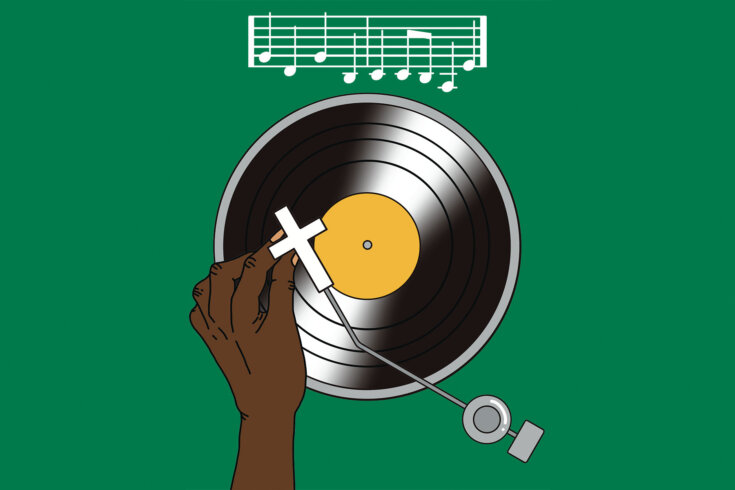
My children are grown, with their own partners, their own lives. But every happy once in a while, we are together again on a Sunday morning. I make their favourite Jamaican breakfast: ackee and salt fish, boiled green banana, callaloo, fried plantain, Johnny Cakes, and hard-dough bread.
I soak the salt cod overnight and wake up early to flake it. While I prepare the fish and knead the dumplings—the way my grandmother did, smoothing the dough flat and rolling it into a small ball—I listen to my Sunday-morning playlist. It is made up mostly of songs in the southern gospel tradition—spiritual ballads like “Because He Lives” or the militaristic “There Is Power in the Blood.” Music derived from the centuries-old European hymnal, updated in expression, calming in its strict adherence to conventional rhythm and form.
When we sit down to eat, we inhale the briny aroma, then inhale the food. We are so busy eating, we hardly converse. Then, in the quiet, they notice the music. “Mother! What are we listening to!” they exclaim. “How can you be so Black and militant and still listen to these white southern hymns. You make no sense!” I change the music to something we can all enjoy: Mahalia Jackson’s “Take My Hand, Precious Lord,” perhaps, or some classic Bob Marley.
My kids consider southern gospel the soundtrack for segregation the same way they consider freedom songs the soundtrack for the civil rights movement. They came of age during the Obama White House. To them, Donald Trump is an aberration of that civilized norm, not a reversion to an ever more right-leaning, white-leaning political milieu. Unlike my children, I was born in a segregated Canada, by which I do not mean a country racially divided. My country, politically speaking, was white—and I grew up in it.
Naturally, as a Jamaican family, we went to church—at least my sister and I did. My mother stopped attending in 1963 because she was mad at God for allowing the Ku Klux Klan to bomb the 16th Street Baptist Church in Birmingham, Alabama, murdering four little Black girls. My father celebrated his faith from the comfort of his bed. On Sunday mornings, he watched the pastor Rex Humbard on TV. Humbard preached the opposite of fire and brimstone. “I am loved,” went the refrain of his theme song. On Sunday nights, my father tuned in to evangelist Kathryn Kuhlman, who declared the people she laid hands on were “slain in the Spirit.”
He loved his gospel albums, especially the hymns of Jim Nabors, as well as those of Johnny Cash, with whom he regularly belted out “When the Roll Is Called Up Yonder.” He was a difficult person, my father: he drank a lot and could be mean. But he cherished simple Jamaican values, the kind reflected in southern gospel music.
I was drawn to southern gospel for the same reason I was drawn to southern literature: because I sensed it contained me—somewhere. In the hyper-white culture of my girlhood, I rarely ran into myself—not in a toy or a story or a character on TV. I sought out vestiges of myself in the strangest places: in the margins, between the lines, in the hyphens connecting words, in the gaps between the Underground Railroad and the tracks of CN Rail. I was like a spy in enemy territory; I only knew myself from oblique perspectives.
Which brings me back to Mahalia Jackson. When I listen to Jackson sing “Take My Hand, Precious Lord,” I am riding the ragged waves of the Middle Passage, I am meeting my soul face to face. Southern gospel doesn’t make me feel that way. I enjoy it in part because it hardly makes me feel at all. In a way, that’s the pleasure of it. And, also, the guilt: that I am so often comfortable feeling alienated from my own emotions, an insidious consequence of growing up Black in a white world.
And yes, of course, I feel Black joy. But I wonder if the cry for Black joy is really a ploy for the evasion of Black pain? Because who actually believes Black people lack joy?







